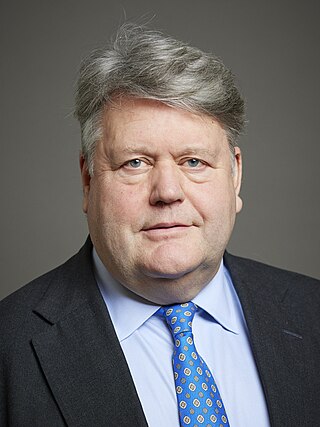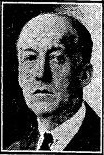
The House of Lords is the upper house of the Parliament of the United Kingdom. Like the lower house, the House of Commons, it meets in the Palace of Westminster in London, England. One of the oldest institutions in the world, its origins lie in the early 11th century and the emergence of bicameralism in the 13th century.

Peerages in the United Kingdom form a legal system comprising both hereditary and lifetime titles, composed of various ranks, and within the framework of the Constitution of the United Kingdom form a constituent part of the legislative process and the British honours system. The British monarch is considered the fount of honour and is notionally the only person who can grant peerages, though there are many conventions about how this power is used, especially at the request of the British government. The term peerage can be used both collectively to refer to the entire body of titled nobility, and individually to refer to a specific title. British peerage title holders are termed peers of the Realm.

The Peerage Act 1963 is an Act of the Parliament of the United Kingdom that permits female hereditary peers and all Scottish hereditary peers to sit in the House of Lords and allows newly inherited hereditary peerages to be disclaimed.
The Peerage of the United Kingdom is one of the five Peerages in the United Kingdom. It comprises most peerages created in the United Kingdom of Great Britain and Ireland after the Acts of Union in 1801, when it replaced the Peerage of Great Britain. New peers continued to be created in the Peerage of Ireland until 1898

Thomas Galloway Dunlop du Roy de Blicquy Galbraith, 2nd Baron Strathclyde,, known informally as Tom Strathclyde, is a British Conservative politician. Lord Strathclyde served in the political role of Leader of the House of Lords from the 2010 general election until January 2013 and as Chancellor of the Duchy of Lancaster, having been Leader of the Opposition in the House of Lords (1998–2010). As of 2024, he is the most recent hereditary peer to serve as Leader of the Lords.

The House of Lords Act 1999 is an Act of the Parliament of the United Kingdom that reformed the House of Lords, one of the chambers of Parliament. The Act was given Royal Assent on 11 November 1999. For centuries, the House of Lords had included several hundred members who inherited their seats ; the Act removed such a right. However, as part of a compromise, the Act allowed ninety-two hereditary peers to remain in the House. Another ten were created life peers to enable them to remain in the House.

Earl of Bessborough is a title in the Peerage of Ireland. It was created in 1739 for Brabazon Ponsonby, 2nd Viscount Duncannon, who had previously represented Newtownards and County Kildare in the Irish House of Commons. In 1749, he was given the additional title of Baron Ponsonby of Sysonby, in the County of Leicester, in the Peerage of Great Britain, which entitled him to a seat in the British House of Lords. The titles Viscount Duncannon, of the fort of Duncannon in the County of Wexford, and Baron Bessborough, of Bessborough, Piltown, in the County of Kilkenny, had been created in the Peerage of Ireland in 1723 and 1721 respectively for Lord Bessborough's father William Ponsonby, who had earlier represented County Kilkenny in the Irish House of Commons.
Baron de Mauley, of Canford in the County of Dorset, is a title in the Peerage of the United Kingdom. It was created on 10 July 1838 for the Whig politician the Hon. William Ponsonby, who had earlier represented Poole, Knaresborough and Dorset in the House of Commons. He was the third son of the 3rd Earl of Bessborough, an Anglo-Irish peer, and his wife Lady Henrietta Spencer, daughter of the 1st Earl Spencer. He married Lady Barbara Ashley-Cooper, the daughter of Anthony Ashley-Cooper, 5th Earl of Shaftesbury. She was one of the co-heirs to the ancient barony by writ of Mauley, which superseded the feudal barony the caput of which was at Mulgrave Castle, Yorkshire, which barony by writ had become extinct in 1415.

Baron Ponsonby of Shulbrede, of Shulbrede in the County of Sussex, is a title in the Peerage of the United Kingdom. It was created in 1930 for the politician Arthur Ponsonby. Ponsonby was the third son of General Sir Henry Ponsonby and the great-grandson of Frederick Ponsonby, 3rd Earl of Bessborough. Frederick Ponsonby, 1st Baron Sysonby, was his elder brother. The first Baron's grandson, the third Baron, was also a Labour politician and notably served as Opposition Chief Whip in the House of Lords in the 1980s. As of 2017 the title is held by the latter's only son, the fourth Baron, who succeeded in 1990. He sat on the Labour benches in the House of Lords prior to the passing of the House of Lords Act 1999, when he lost his seat. However, in 2000 he was given a life peerage as Baron Ponsonby of Roehampton, of Shulbrede in the County of West Sussex, and was able to retake his seat in the House of Lords.
In the United Kingdom, life peers are appointed members of the peerage whose titles cannot be inherited, in contrast to hereditary peers. Life peers are appointed by the monarch on the advice of the prime minister. With the exception of the Dukedom of Edinburgh awarded for life to Prince Edward in 2023, all life peerages conferred since 2009 have been created under the Life Peerages Act 1958 with the rank of baron and entitle their holders to sit and vote in the House of Lords, presuming they meet qualifications such as age and citizenship. The legitimate children of a life peer appointed under the Life Peerages Act 1958 are entitled to style themselves with the prefix "The Honourable", although they cannot inherit the peerage itself. Prior to 2009, life peers of baronial rank could also be so created under the Appellate Jurisdiction Act 1876 for senior judges.

Arthur Augustus William Harry Ponsonby, 1st Baron Ponsonby of Shulbrede, was a British politician, writer, and social activist. He was the son of Sir Henry Ponsonby, Private Secretary to Queen Victoria, and Mary Elizabeth Bulteel, daughter of John Crocker Bulteel. He was also the great-grandson of The 3rd Earl of Bessborough, The 3rd Earl of Bathurst and The 2nd Earl Grey. The 1st Baron Sysonby was his elder brother.

Lieutenant Colonel Rupert Charles Ponsonby, 7th Baron de Mauley,, is a British hereditary peer, former Parliamentary Under-Secretary at the Department for Environment, Food and Rural Affairs and retired Territorial Army officer.
Baron Ponsonby may refer to:

Rupert Bertram Mitford, 6th Baron Redesdale, Baron Mitford, is a British hereditary peer, Liberal Democrat politician and member of the prominent Mitford family.

William Ponsonby, 2nd Earl of Bessborough was a British politician and public servant. He was an Irish and English peer and member of the House of Lords. He served in both the Irish and the British House of Commons, before entering the House of Lords, and held office as a Lord Commissioner of the Admiralty, Lord Commissioner of the Treasury, and as Postmaster General of the United Kingdom. He was also a Privy Counsellor, Chief Secretary for Ireland and Earl of Bessborough.
Thomas Arthur Ponsonby, 3rd Baron Ponsonby of Shulbrede, was a British hereditary peer and Labour Party politician.

Matthew Henry Herbert Ponsonby, 2nd Baron Ponsonby of Shulbrede was a British peer.














